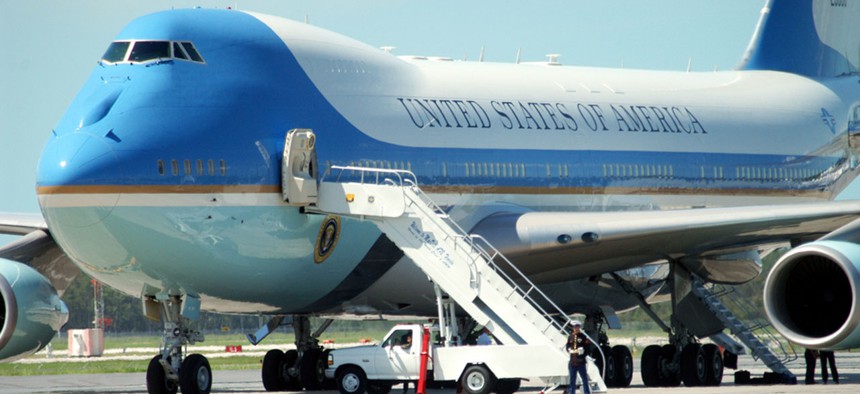Trump’s Air Force One Tweet Rattles the Defense Industry
Was the president-elect trying to drive down a price tag — or slap back at a CEO’s policy suggestions?
There are plenty of Pentagon projects that are over budget. A fledgling effort to replace the president’s aging Air Force One jets is not one of them. So when the president-elect tweeted, mysteriously and inaccurately, that Boeing’s costs were “out of control,” it sent chills through the defense industry.
What on earth was Donald Trump doing? And what should other companies do if it happens to them?
“I know the right answer is not going to be ‘tweet back,’” said David Melcher, the CEO and president of the Aerospace Industries Association, the lobbying organization that advocates for Boeing and many of America’s largest defense firms.
At 8:52 a.m. Tuesday, Trump tweeted, “Boeing is building a brand new 747 Air Force One for future presidents, but costs are out of control, more than $4 billion. Cancel order!” Within 14 hours, the tweet had more than 37,000 retweets and 116,000 likes.
“The tweet raises a risk we had feared, and that is that a populist president will publicly attempt to shame contractors, though in this case, the motive may have been worse than a major cost over-run or poor program performance,” Byron Callan, an analyst with Capital Alpha Partners, said in a note to investors.
Callan and others have speculated that Trump’s anti-Boeing tweet might have been a response to a Chicago Tribune article in which the firm’s CEO opined about the president-elect’s trade policies.
“These sorts of tweets may represent a risk for defense investors, but by and large, we see the risk as fleeting,” Callan wrote.
Trump got several things wrong in his tweet. No order has yet been issued for the new planes — and that’s planes, plural. The Air Force is planning to buy two new jetliners to replace the 26-year-old Boeing 747-200s that have served presidents since George H.W. Bush. But so far, the service has only awarded a $170 million contract to design the next Air Force Ones, which are custom-built mobile command centers designed to stay aloft and connected during a nuclear war. The contract went to Boeing, the only American company that still builds jetliners.
The Air Force plans to spend about $2.8 billion on the project over the next five years, according to Pentagon budget documents. The entire project, for the two tricked-out planes, could reach $4 billion, depending on the type of equipment deemed necessary.
Boeing responded to Trump’s comments with a short statement in which it mentioned the $170 million contract. “We look forward to working with the U.S. Air Force on subsequent phases of the program allowing us to deliver the best planes for the President at the best value for the American taxpayer,” the firm said.
AIA’s Melcher — who briefed then-candidate Trump on defense industry concerns over the summer — applauded Boeing’s handling of the incident.
“I think our job is really to speak as the collective voice of all of companies on issues that we think are important across the industry and not to try to respond or react to today’s tweet or tomorrow’s tweet or anything else,” he said.
“I think our response would be in line with Boeing’s, which is, ‘let’s just look at the facts of this,’” Melcher said. “If you want the Defense Department to look at the requirements and see if they’re too restrictive, causing too much cost, well then perhaps that’s something that could be reexamined.”
Melcher also had these words of advice: “What is tweeted today is not necessarily going to be the policy of tomorrow.”




